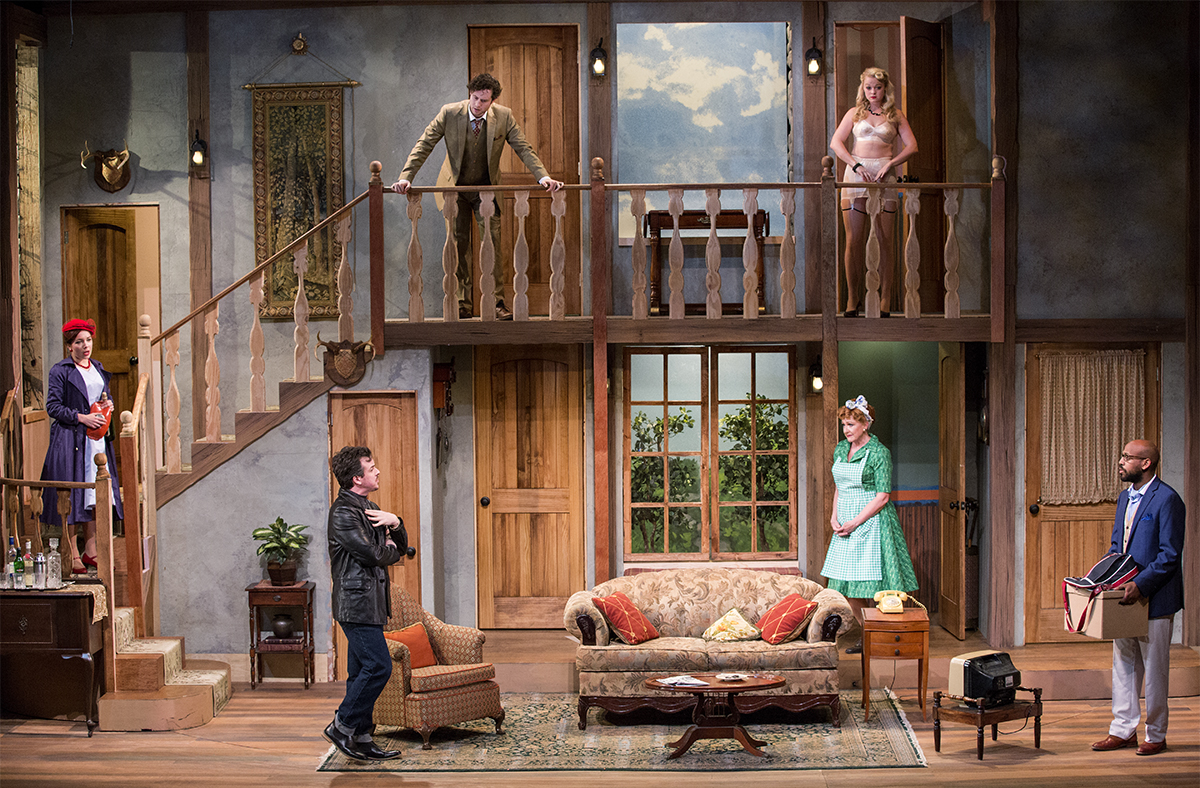The 167 miles from my house in Pittsburgh took about three hours. But it really took me nearly 50 years — the time I’ve lived in Pittsburgh and never made it those few hours north to the Chautauqua Institution.
Why did it take so long, especially after the Chautauqua Theater Company was founded just 30-some years ago, when I was busy going everywhere to review theater for the Pittsburgh Post-Gazette?
And more to the point, why now? Because everyone ought to see Chautauqua, you could say, but the real answer is that the opening show of the theater company’s 2017 season is Michael Frayn’s great theater-spoofing farce, Noises Off, which I’d happily go much more than 167 miles to see.
If you’re a regular theater-goer, the odds are you’ve seen Noises Off, but even if you haven’t, it initially feels as if you have. In a generic English country house, enter Mrs. Clackett, the dotty housekeeper; then the preening real estate agent bringing a willing young blonde for a midday quickie in what they assume is an empty house; followed immediately by the couple who are pretending to be in Spain to avoid the income tax. Considering the set’s eight doors and two other entrances, you know right off it’s a farce.
Those doors enable the characters to do an oblivious dance round each other for a long time. But what raises the farce to a higher level of complexity is its abundant, deliciously malevolent props: telephone, newspaper, bed sheets, door knobs, contact lenses, boxes of files, bottles of whiskey and rapidly multiplying plates of sardines, all with lives of their own.
But then the housekeeper breaks focus — should she exit with the sardines? what about the newspaper? — and an exasperated voice interrupts from the audience. It’s the director of what we suddenly realize is a play within the play, and that play, the real play, is all about staging a farce on the verge of disaster, with opening night just hours away.
Act 1 takes us through the first act of Nothing On (a triple-entendre sex farce title), introducing the quirks of the cast and crew. Then in Act 2, the entire set revolves so we can watch the chaos backstage, now a month later, as the cast performs that same first act for an unseen audience while subverting each other, letting loose their accumulated jealousies.
And for Act 3, farce-master Frayn spins the set around again, so we watch from the front as the same act, now two months later, devolves into terminal incoherence, but all the funnier as the two plays continue to twist, turn and intersect, as if proving a theorem in higher comic algebra.
So what’s the serious side of all this? Actors are their own worst enemies? Theater people sleep around a lot? Never trust your props? The best laid plans of mice and men …?
Nope, it’s just a silly, stock story, but polished to comic richness by transparency and backstage complication, then raised to near jaw-dropping perfection by the acting and playwriting skills that bring it off. I mean the skills of the real actors, not of the “actors” they play. Sometimes you just don’t know which of the nine actors to watch as the epic of ineptitude unfolds.
From the start, Craig Wesley Divino (Lloyd, the director) holds the stage with wry brio. We don’t necessarily like Lloyd, but we identify with his boiling frustration. Similarly, Emily Daly (the hapless assistant stage manager) and Will Harrison (an even more hapless jack-of-all-trades) have the advantage of playing just one character (not an actor playing a character — got it?) and do so very well. I especially admire the anguished reality with which Ms. Daly undergirds the comedy.
If there is a central role, both in the play we see and the play they play, it’s Dotty, the actor playing the housekeeper, played previously by Dorothy Loudon, Patricia Hodge, Lynn Redgrave, Patti LuPone and others, including (in the lousy movie) Carol Burnett. Here, Carol Halstead portrays both the veteran Dotty’s rusty steel and Mrs. Clackett’s fey bewilderment, although they often seem like the same thing.
Kelsey Jenison has the flashiest role, the young actress who plays the blonde with robotic stupidity, largely in her underwear — how can we resist her?
Patrick Foley is a hardworking delight as a fading juvenile, handling some of the most taxing physical comedy. Maggie Mason and Yonatan Gebeyehu are solid as gossip and dimbulb actors playing the tax avoiders. And John Seidman intertwines his alcoholic actor and comic thief, running away with every scene that isn’t nailed down.
Noises Off is as funny a farce as I’ve experienced in a lifetime of theater-going. I’ve seen it about 10 times, going back to the original 1983 New York production, and it doesn’t stale because the theater is an inexhaustible object of fun. The only fault I find is patches of too-far-over-the-top slapstick, but they make a kind of sense, so you watch mesmerized, already exhausted by laughing.
I don’t know what kind of rehearsal period the company affords, but however long it is, director Andrew Borba has drilled his troops beautifully. A couple of more performances will smooth out a few glitches … but why say this? Noises Off is so intricate to stage that perfection is impossible and could even compromise its charm.
Christopher Rawson is the senior theater critic of the Pittsburgh Post-Gazette. A former chair of the American Theatre Critics Association, he has since 1968 been on the English faculty at the University of Pittsburgh, where he regularly teaches a course on August Wilson.





